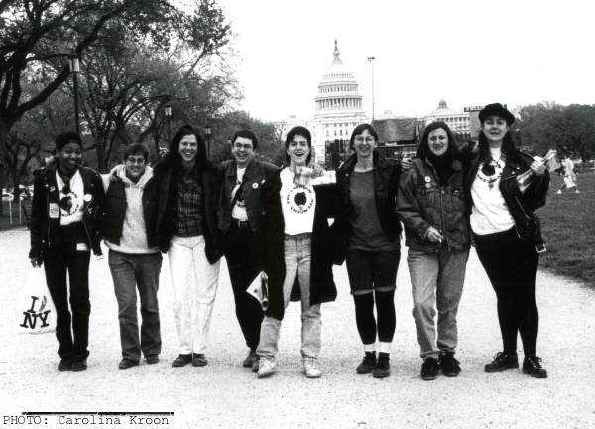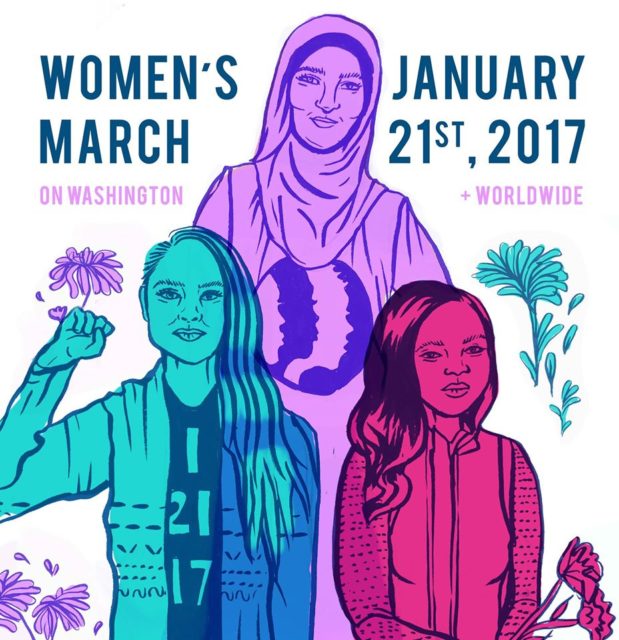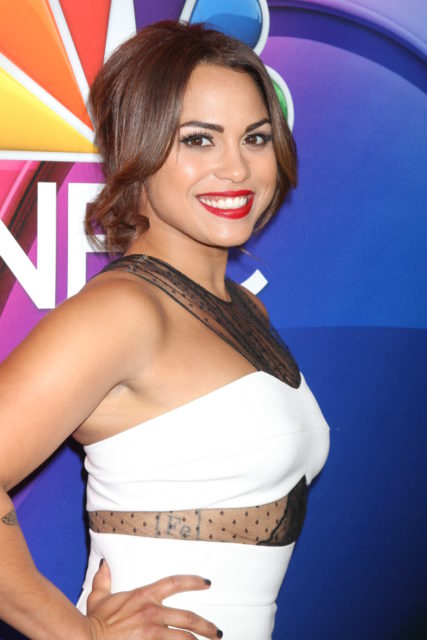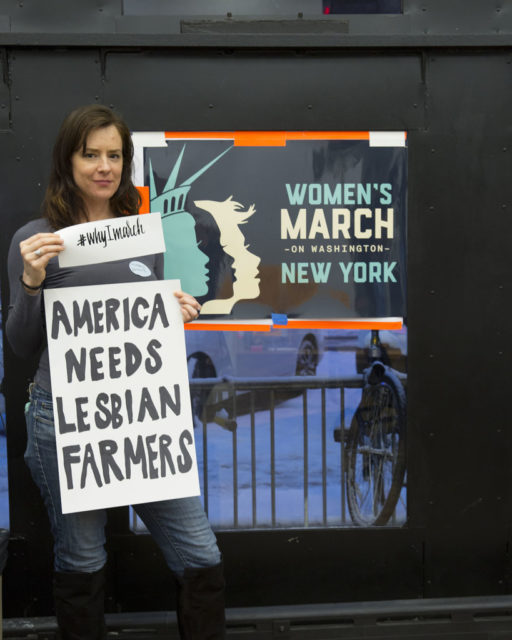As Inauguration Day nears, women worldwide are rallying for the Women’s March on Washington and sister marches in their own cities, ready to protest President-elect Donald Trump and his various policies that would affect women’s lives in multiple ways. With his promises to ban abortions, defund Planned Parenthood—and his dangerous views on immigration, the Affordable Care Act and sexual assault—minority women are even more at risk, with their personal liberties under attack and their everyday personhood in probable peril due to the coming administration’s threats.
Many important women’s marches have graced America’s annals, but one significant demonstration for LGBT women happened 24 years ago at the 1993 March on Washington. The LGBTQ community gathered in D.C. to demand policies that supported soldiers serving out and openly in the military, non-discrimination legislation protections and reproductive freedoms, among various other basic rights. Kelly Cogswell, one of the founders of the New York-based advocacy group Lesbian Avengers, attended the 1993 March.

“I’m not sure how different [the political climate is today],” Cogswell said. “I’ve actually been having flashbacks to 1992 when Pat Buchanan went to the Republican National Convention and declared a war, a ‘Culture War for the soul of America.’ The enemies? People of color, and women, and environmentalists, and, of course, queers. Then, as now, it was a backlash against the progress all social minorities had made, especially in the ’70s. We see huge gains in the Civil Rights movements, Women’s and Gay Lib—and then, BAM! This horrible hate.”
Queer women’s involvement in the 1993 event birthed a worldwide, annual historic protest and the largest of its kind: The Dyke March.
“When we heard about the [1993 March on Washington] and checked it out, lesbians were barely there,” Cogswell said. “Our response was to hold a Dyke March the night before. A couple of other groups had the same idea, so we joined forces.” A reported 20,000 women congregated for the first-ever Dyke March, and now Dyke Marches take place internationally in conjunction with Pride celebrations and sometimes independently, equal parts protest and celebration of the dyke identity, which includes women who are anything but straight.
“The thing I like about [Dyke Marches], especially the one in New York, is that they have a clear message, but they’re flexible enough to include a diverse crowd,” Cogswell said.

That same kind of diversity remains a necessity for the Women’s March. Over the years, feminism and women’s advocacy events have struggled with inclusion—not only of LGBTQ women, but of women of color, especially at the leadership level.
“I got involved with the NYC [Women’s March] chapter because I felt there was a need for black queer women to change narrative that the Women’s March is only about white cisgender heterosexual middle-class white women,” said Jewel Cadet, program manager of Youth & Community Empowerment at The Center for Anti-Violence Education. “I read a few think pieces on how many black and WOC [Women of Color] were not going to attend because they felt like this March wasn’t for us. I am passionate about taking up space and letting that narrative be put to rest […] Black and WOC who identify as queer have specific issues that impact us differently from white heterosexual women. These issues need to be put on the forefront. They need to be uplifted, and they need to be heard. That is the only way we can reach solidarity; when the voices of the most marginalized are brought to the center of the conversation.”
Cadet asserts that she feels there’s been a lot of want for more queer women of color to get involved with the march, and that she took on the task of making sure it came to fruition.
“I myself had to reach out and jump through many hoops for weeks to get through to the actual organizers for the New York chapter, and even when I did attend that outreach meeting, I was the only black person there. There weren’t even women of color,” Cadet said. “I committed and volunteered myself to organize an ‘intersectional bus’ that would be intentionally inclusive of transgender people, gender non-conforming people, cisgender black women and cisgender women of color.”
That bus now boasts a sponsorship, and with this weekend’s Women’s March on Washington focusing on women and inevitably hosting thousands of allies, it’s more important than ever that all LGBTQ women are present and visible to ensure that our voices are heard and the rights we demands are met.
Out Latina actress Monica Raymund (“Chicago Fire”) is joining the Artists Table and March in D.C. and says it’s important for her to “exercise [her] constitutional right to protest and stand up for [her] values.”
“With the divisiveness polluting or political living rooms and the impending administration’s war on religious freedom, women’s rights and American equalities, I feel I have a responsibility to represent myself, my body, and the rights that are promised to me in the Constitution of the United States,” Raymund said.

Despite the women’s movement’s somewhat checkered past regarding its inclusion of lesbian, bisexual women, transgender, queer/questioning women and women of color, feminism has increasingly grown more intersectional and inclusive.
“The centrality of ‘women’s’ issues to our lives is why lesbians have traditionally been such an important part of the women’s movement,” Cogswell said. “Because our issues are women’s issues, even if there’s not a 100 percent overlap. A lesbian’s right to be with the partner of her choice is related to a woman’s right to choose, right? Be in control of her own body?”
“Queer women have always taken integral roles in progressive activist movements, and this march is no different,” said Mary Emily O’Hara of the NYC Chapter of the Women’s March on Washington. “People are coming from all over the world to march on Washington, not only for women’s rights, but to respond to a new federal cabinet that is the most blatantly anti-LGBT in history. As a lesbian, I’m especially concerned about anti-LGBT legislation like the First Amendment Defense Act, which would ban the government from taking action against any company or person who discriminates against an LGBT American.”

With Donald Trump and his proposed cabinet promoting what has all the stripes of a homophobic agenda, there’s more fear than ever that LGBTQ people and women will lose a lot—and that minority women will get hit with a double whammy. Cogswell maintained, however, that she is hopeful straight allies will understand how queer women’s rights align closely with their own, and view the resistance to Donald Trump and his cronies’ insidious plans as a shared fight.
“Young straight feminists are always like, ‘We love lesbians,’ but they never really consider that lesbian issues are women’s issues,” Cogswell said. “From economic questions, to what it means to have two women both with cut-rate salaries trying to make ends meet, to how our bodies are continually policed. And colonized, and violated. Lesbophobia is awful for dykes, but it’s used against straight women all the time, too, if they turn a guy down, or talk back, or have strong bodies.
Cadet worries that, despite efforts made, the march may still lack visibility.
“I don’t think there will be a large percentage of openly LGBTQIA people because the march doesn’t cater to the most marginalized people,” Cadet said. “If people don’t feel like you are fighting for issues outside of your own—cis heteronormative—then many won’t come out and support such an event. The bus that I am captain of will be filled with LGBTQIA people, but it wasn’t easy getting folks to want to come to a March that has been marketed as one that is very white, very cisgender and very heteronormative.”
But Mary Emily O’Hara said she’s feeling good about the presence of queer women and allies that she’s met through the New York chapter.
“The marchers I’ve spoken with—straight and queer alike—often express concern about the future of LGBT rights under the new administration,” O’Hara said. “At our sign-making workshops, I’ve seen New Yorkers making posters that specifically address LGBT identities and equality. Expect to see a lot of rainbows at the March.”
Still, some don’t understand the need for marching or political protest, seeing them as unfruitful or unable to produce results.
Cogswell heartily disagrees with that line of thought. “Just because you can’t see an immediate impact, doesn’t mean you’re not having one,” she said. “Marches serve a lot of purposes. One is reminding politicians that we actually exist in the flesh. And we have opinions. They spend too much time in their own echo chambers that I think they often forget that the outside world exists. Another important reason to demonstrate is to claim public space as our own, and exercise our right to protest in public while we still have it. You don’t use it, you lose it.”
“But sometimes, the most important reason to demonstrate is to see other people that feel the same way you do,” Cogswell continued. “It’s incredible to experience what it feels like to have your voice amplified by a dozen, a hundred, a thousand times. The worst thing in the world is feeling small and powerless, like it’s you against the world. And it’s not.”

“This march isn’t about being anti-Trump; rather, this march is about unifying people from all political walks of life who can come together under the same common interest that all people have the right to life, liberty and the pursuit of happiness,” Raymund said. “I will fight for my rights because right now, it is what I must do.”
And after the marches this weekend, it’s imperative that women never quit their activism and advocacy, and instead incorporate these crucial practices into their daily lives.
“I think street activism and marches are hugely important, but they’re not enough,” Cogswell said. “They are a great way to make things visible, to connect people, sometimes they can even stop things. But real change is usually slower. Especially when you’re trying to build something. I think activism and civic participation have to become a habit—like flossing your teeth.”
GO will be at the March on Washington and in sister marches in New York and Los Angeles. To register to attend, march with a group, find transportation, locate hosts offering free housing this weekend, and for more important information on the Women’s March on Washington and the Women’s March on Washington—New York Chapter, visit these links, or search Facebook for a Women’s March in a city near you:
D.C. March
Women’s March on Washington official site: https://www.womensmarch.com/
Women’s March on Washington Facebook page: https://www.facebook.com/
NYC March
Women’s March on Washington—NYC Chapter Facebook page: https://www.facebook.com/

What Do You Think?